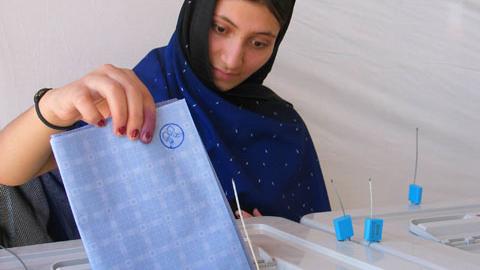KABUL - As a United Nations team of experts wraps up its first visit to Afghanistan to map out future UN assistance for the 2014 Presidential elections today, the Afghan election body has said preparations for the polls are right on track and it is already working to establish the framework for voting.
The outgoing acting Chief Electoral Officer, Zekria Barakzai, told UNAMA two weeks ago that the Independent Election Commission of Afghanistan (IEC) was scrambling for ways to make sure voter registration was fair and transparent and to administer this critical national election, only the third since the fall of the Taliban.
Administering a large national election is a huge task. The IEC has requested US$ 150 million to conduct the polls. Mr. Barakzai said the IEC was confident that donors would provide funding.
Mr. Barakzai said a plan for voter registration would be finalized by the end of this month and the IEC would work out the operational plan for the election by March 2013.
The Chairman of IEC, Fazal Ahmad Manawi, signed an agreement with the UN in October 2012, under which a three-member UN Needs Assessment Mission (NAM) conducted a study from 27 November to 5 December to identify Afghanistan’s specific voter registration and election process needs. A second assessment mission will be held in early 2013.
“The assessment is a UN mechanism to consider the most appropriate forms of UN electoral assistance,” said a statement released by UNAMA on 3 December. “The purpose of NAM is to evaluate the political and electoral environment in the country, the legal and institutional framework governing the electoral process and the capacity and needs of the various election stakeholders.”
The IEC said it was putting in place certain measures to prevent fraud. Codes of conduct are being developed for government employees and for security forces.
“We want to make sure that the government’s resources are not used to favour any candidate and that government employees will fully comply with the rules of the IEC during the elections,” said Mr. Barakzai. “It is important that the IEC has the trust and confidence of all segments of society, particularly the political parties and civil society organizations. We have regular consultations with them on anti-fraud measures.”
To prevent fraud, votes will be counted at the polling station in the presence of representatives from political parties, civil society and the media. A mechanism of checks and balances for the temporary staff of the IEC is also being worked out.
The Afghan election body plans to hire nearly 150,000 people. Almost all of these will be temporary employees to conduct registration and manage voting centres. Currently, the IEC has 400 permanent employees.
The United Nations will play an important role in the elections through technical and financial assistance. This is in line with its Security Council mandate (Resolution 2041) which authorizes UNAMA to “support, at the request of the Afghan authorities, the organization of future Afghan elections, as well as to strengthen, in support of the Government of Afghanistan’s efforts, the sustainability, integrity and inclusiveness of the electoral process,… and provide capacity building and technical assistance to the Afghan institutions involved in this process”.
UNAMA welcomed 31 October announcement by the IEC of the timeline leading to the 2014 elections in accordance with the Constitution. “UNAMA reaffirms its commitment to support the organization of the elections at the request of the Afghan authorities and institutions as mandated by the United Nations Security Council,” said a UNAMA statement.
On the other hand, ELECT II (Enhancing Legal and Electoral Capacity for Tomorrow II) project of the UN Development Programme has been providing long-term assistance to Afghanistan’s IEC, focusing on institutional strengthening and capacity development, with an overarching objective of supporting the national electoral institutions to plan and conduct credible elections with minimal external support, and to better ensure the integrity of the process.
Besides the technical aspects of managing the elections, there are a number of legal questions that need to be resolved. Discussion on the legal framework governing elections and the IEC is ongoing both at the Council of Ministers and the Parliament.
By UNAMA Kabul
Download UNAMA press statement on the UN Needs Assessment Mission in Kabul - English | Dari






